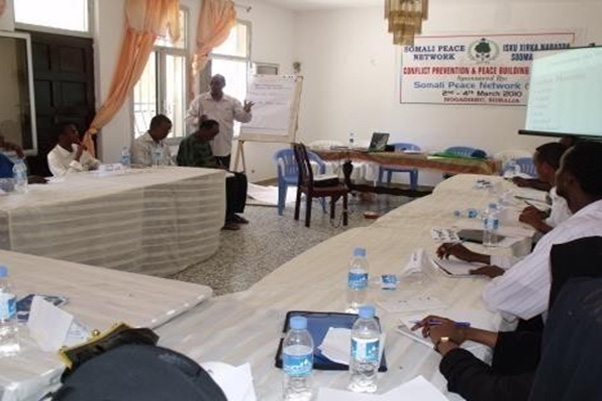Peace Building & Conflict Resolution

Since 2003, SCC has supported communities in Somalia in their quest for long-term peace.
Our efforts to promote peace have been concentrated on enhancing the ability of regional organizations and institutions and transforming local conflicts into community-led peacebuilding initiatives.
Together with our Somali partners, we have made a positive impact on multi-level reconciliation procedures that serve as a solid foundation for larger state-building and stabilization initiatives.
For many years, SCC has collaborated with a select few highly esteemed and related partners.
A major emphasis has been placed on the nature of the relationships and mutual trust, acknowledging the distinctive capabilities of each partner that, when combined, have a stronger impact.
It is important to recognize the symbolism and relevance of this in a setting of continual violence and ingrained mistrust.
The partnership model used by SCC includes co-design, co-planning, and varied degrees of implementation accompaniment.
The focus of capacity development is on shared learning and acknowledging partner and SCC needs.
Traditional structures and cross-community peacebuilding platforms made up of elders, religious leaders, women, youth, members of local government, civil society, and the business community are both given a variety of types of support.
.
Approaches and methods
Sustained Dialogue (SD)
Through the Sustained Dialogue, relationships between various groups of women and youth have strengthened, and over time, these groups have gained a greater awareness of the issues that concern them and the larger community.

Peace meeting in progress in Somalia
Participatory Action Research (PAR)
SCC has adapted the Participatory Action Research (PAR) approach to the context of South-Central Somalia with the goals of supporting longer-term sustainable processes, enhancing existing capacities for peace, and gradually fostering trust and collaboration between conflicting groups at the community-level.
In contrast to traditional modes of research, PAR goes far further than simply gathering and analysing data.
Through its process-oriented nature, it gives those involved in or impacted by conflict the opportunity to consider and come to their own knowledge of the conflict situation while simultaneously being exposed to different viewpoints.
The essential building blocks of this understanding are enhanced further by gradual discourse, moving from "single-identity" to intergroup dialogue. Afterward, dialogue encourages engagement and participation with the goal of addressing some of the divisive factors triggering conflict within and between communities.
IMPACT
Intra and inter-clan dialogues and agreements
Clan-based actors have interacted positively with one another during implementation through discussions and negotiations, both within and across lines of group conflict.
Despite intermittent outbreaks of violence and some failed peace accords, as a consequence of discussions and agreements, violent conflict expressions were decreased across all target locations.
The success is also significantly reflected in the rising use of nonviolent methods, particularly communication and early conflict detection systems, to settle escalating disputes both inside and across clans.
This represents a change from previous practice, where retaliatory attacks (revenge killings; raiding) were made by clans as their initial defense.
